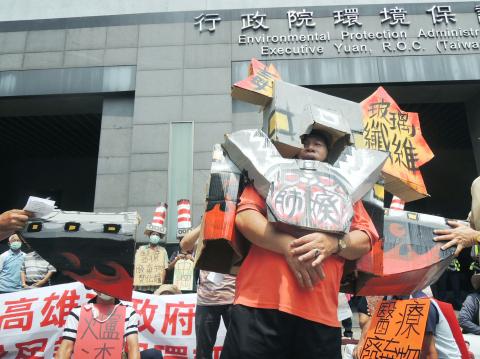Dozens of residents from Greater Kaohsiung’s Dalinpu (大林蒲) area staged a rally in front of the Environmental Protection Administration (EPA) yesterday, protesting the South Star Plan (南星計畫) development project, before the start of an environmental impact assessment (EIA) general assembly meeting in the afternoon.
The South Star Plan’s first phase development project, a 46.64 hectare area of reclaimed land in Greater Kaohsiung’s Siaogang District (小港) that has been targeted for development into a yachting industry park, was among the 14 cases to be discussed during the meeting.
“You will be overcome with sadness if you come and visit the area we live in,” a borough chief surnamed Huang (黃) told committee members and the project developer. “For so many years, the land has been filled with various types of foul industrial waste, including medical waste.”

Photo: Liu Li-jen, Taipei Times
“If the project is approved, we will become like the filling in a sandwich biscuit, squeezed in a small area between several industrial areas, including state-run refiner CPC, Taiwan, state-owned integrated steelmaker China Steel, and state-owned Taiwan Power,” he said, adding that many local residents have already become sick from air pollution.
A local resident in her 60s, Chen Yu-hsi (陳玉西), said she was furious that the area that she has lived in for more than 60 years used to have a beautiful coastline and quality farmland, but is now occupied by high-polluting industries.
Moreover, the last stretch of coastline may become developed by the yachting industry, leaving them with “no more place to breathe fresh air,” Chen said.
A member of a local culture protection group said that although major development projects are always touted as creating job opportunities in rural areas, they have instead created industries where working conditions are often “highly polluted, very dangerous, with long working hours and low salaries,” so young people are still eager to leave the area to seek employment elsewhere.
Other concerns include sediment from the ocean near the landfill area that may be contaminated with heavy metal substances and the pollution that may be caused by the yachting industry.
The project failed to pass the review yesterday afternoon, with the assembly citing an incomplete evaluation of the risks involved.
Several other cases that were discussed during the meeting yesterday also faced protests and opposing opinions from local residents and civic groups.
Residents from Yunlin and Penghu expressed concern that Taiwan Power’s plans to build a submarine cable between Yunlin County and Penghu County might lead to overpumping of groundwater, which might destabilize the foundation of houses nearby. They were also concerned about the negative effects of long-term exposure to high levels of electromagnetic radiation.
Meanwhile, residents from Miaoli County’s Yuanli Township (苑裡) protested against wind turbines being erected too close to their homes, saying it could pose a health risk.
They said that the wind energy company included in the project did not communicate with local residents before beginning its construction work.
Civic environmentalist groups expressed concern about the environmental monitoring project at Changhua County’s Changpin Industrial Park (彰濱工業區), questioning why a few important items were not included, such as the soil, groundwater and the rare species of Chinese white dolphin off the coastline near the park.

Chinese Nationalist Party (KMT) Chairman Eric Chu (朱立倫), spokeswoman Yang Chih-yu (楊智伃) and Legislator Hsieh Lung-chieh (謝龍介) would be summoned by police for questioning for leading an illegal assembly on Thursday evening last week, Minister of the Interior Liu Shyh-fang (劉世芳) said today. The three KMT officials led an assembly outside the Taipei City Prosecutors’ Office, a restricted area where public assembly is not allowed, protesting the questioning of several KMT staff and searches of KMT headquarters and offices in a recall petition forgery case. Chu, Yang and Hsieh are all suspected of contravening the Assembly and Parade Act (集會遊行法) by holding

PRAISE: Japanese visitor Takashi Kubota said the Taiwanese temple architecture images showcased in the AI Art Gallery were the most impressive displays he saw Taiwan does not have an official pavilion at the World Expo in Osaka, Japan, because of its diplomatic predicament, but the government-backed Tech World pavilion is drawing interest with its unique recreations of works by Taiwanese artists. The pavilion features an artificial intelligence (AI)-based art gallery showcasing works of famous Taiwanese artists from the Japanese colonial period using innovative technologies. Among its main simulated displays are Eastern gouache paintings by Chen Chin (陳進), Lin Yu-shan (林玉山) and Kuo Hsueh-hu (郭雪湖), who were the three young Taiwanese painters selected for the East Asian Painting exhibition in 1927. Gouache is a water-based

Taiwan would welcome the return of Honduras as a diplomatic ally if its next president decides to make such a move, Minister of Foreign Affairs Lin Chia-lung (林佳龍) said yesterday. “Of course, we would welcome Honduras if they want to restore diplomatic ties with Taiwan after their elections,” Lin said at a meeting of the legislature’s Foreign Affairs and National Defense Committee, when asked to comment on statements made by two of the three Honduran presidential candidates during the presidential campaign in the Central American country. Taiwan is paying close attention to the region as a whole in the wake of a

OFF-TARGET: More than 30,000 participants were expected to take part in the Games next month, but only 6,550 foreign and 19,400 Taiwanese athletes have registered Taipei city councilors yesterday blasted the organizers of next month’s World Masters Games over sudden timetable and venue changes, which they said have caused thousands of participants to back out of the international sporting event, among other organizational issues. They also cited visa delays and political interference by China as reasons many foreign athletes are requesting refunds for the event, to be held from May 17 to 30. Jointly organized by the Taipei and New Taipei City governments, the games have been rocked by numerous controversies since preparations began in 2020. Taipei City Councilor Lin Yen-feng (林延鳳) said yesterday that new measures by